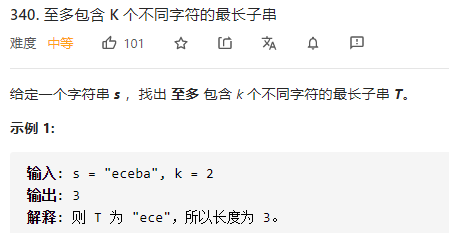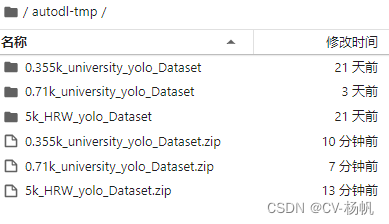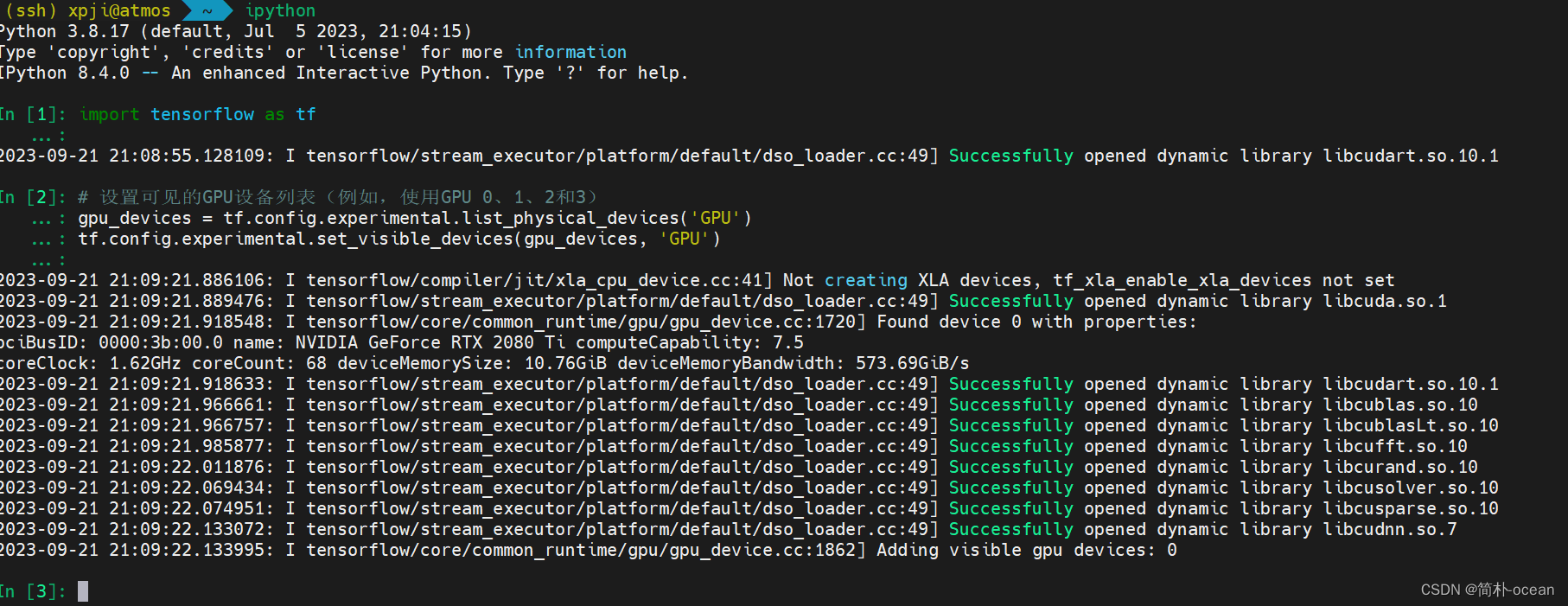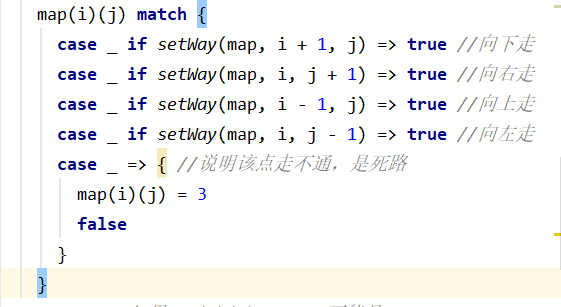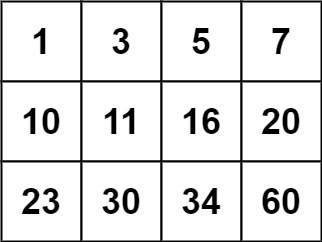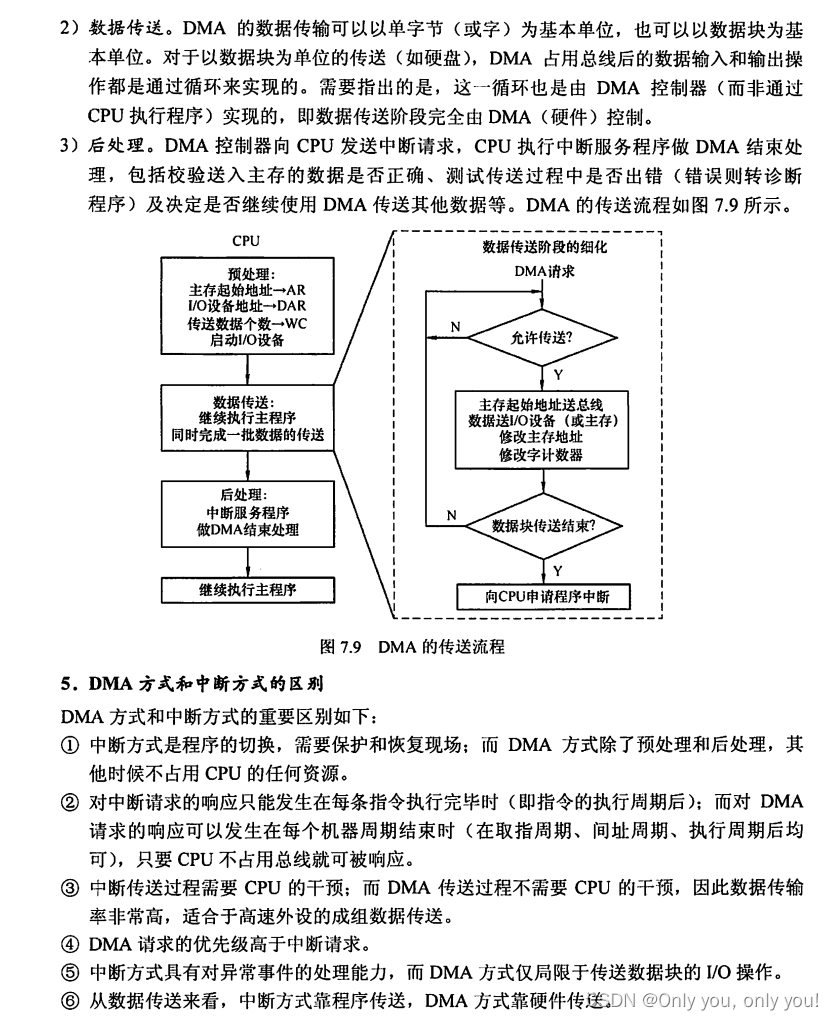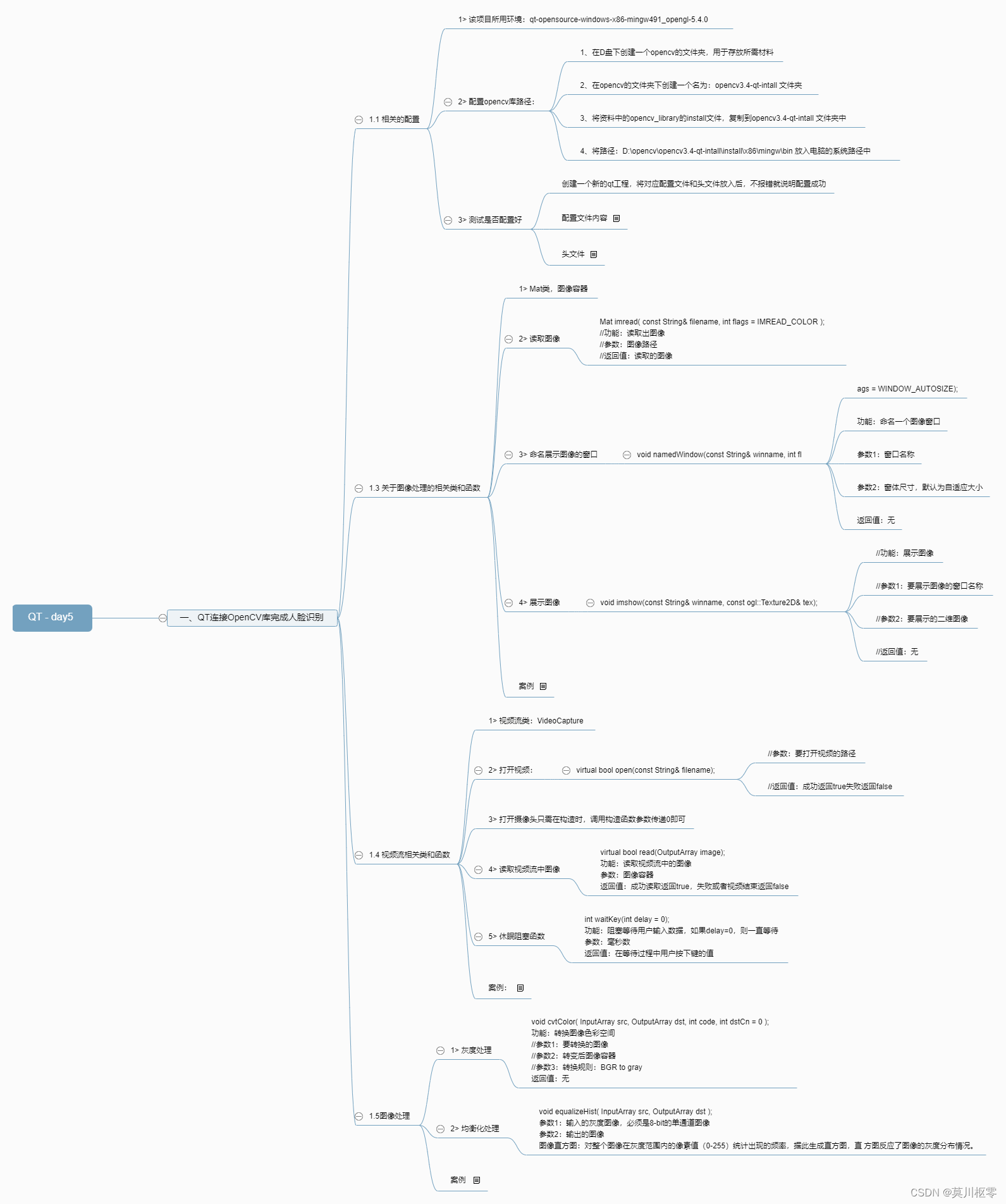文章目录
- 前言
- 一、模板参数的改造
- 二、模板的特例化操作
- 三、仿函数的妙用
- 四、unordered迭代器基本操作
- 1.const迭代器注意:
- 2.HashTable与HTIterator的冲突
- 五、迭代器的构造问题
- 六、完整代码
- 1.hash_bucket.h
- 2.unordered_set.h
- 3.unordered_map.h
前言
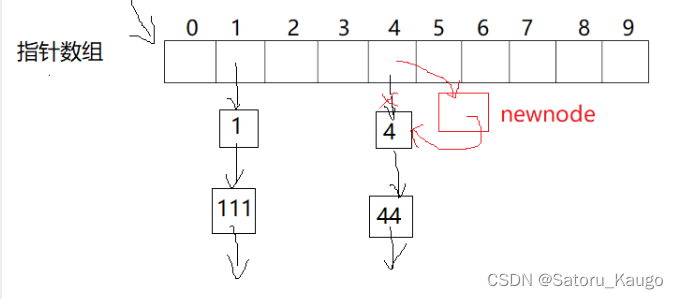
我们开辟一个指针数组,指针数组中存放我们结点的类型,我们算出元素的下标hashi后,头插在数组的对应位置,数组的位置可以链接一串链表,所以也避免了哈希冲突
一、模板参数的改造
我们这里把pair<K,V>看成一个整体,我们设计模板的时候就不需要考虑是不是键值对类型,需不需要多传一个模板参数的问题,达到了普适性。
template<class T>
struct HashNode {
T _data;
HashNode<T>* _next;
HashNode(const T& data)
:_data(data),
_next(nullptr)
{}
};
在map中,T传pair<K,V>类型
在set中,T传K类型
二、模板的特例化操作
我们要想插入一个结点,肯定要知道这个结点插入的位置,所以我们要自己写一个哈希函数的模板来进行下标的计算,但我们int类型之间计算下标很容易,那我们字符串该怎么办?
这个时候就需要模板的特例化了,根据传入的参数不同,具体类型具体分析
template<class K>
struct DefaultHashFunc {
size_t operator()(const K& key) {
return (size_t)key;
}
};
template<>
struct DefaultHashFunc<string> {//对字符串特殊处理
size_t operator()(const string& str) {
size_t hash = 0;
for (auto e : str) {
hash *= 131;
hash += e;
}
//字符串的总和再与131相乘,
//减少字符串和雷同的情况
return hash;
}
};
之后再对算出的hash进行取模的操作
三、仿函数的妙用
我们value_type类型用模板参数T代替之后,这个时候就会衍生一个问题,我T可能为键值对类型,我键值对之间怎么比较呢?
例如:T t1与T t2两个变量,我们肯定不能直接比较,肯定要依据他们的键值大小进行比较,所以我们需要自己写一个用于比较的函数,这个时候仿函数刚好能发挥这个用处,可以作为模板参数传入自己写的比较函数
取出他们的键,让他们进行比较,这里set也这样写是为了配合map,因为两者都用的一个哈希桶模板
struct SetKeyOfT {
const K& operator()(const K&key) {
return key;
}
};
struct MapKeyOfT
{
const K& operator()(const pair<K, V>& kv)
{
return kv.first;
}
};
四、unordered迭代器基本操作
1.const迭代器注意:
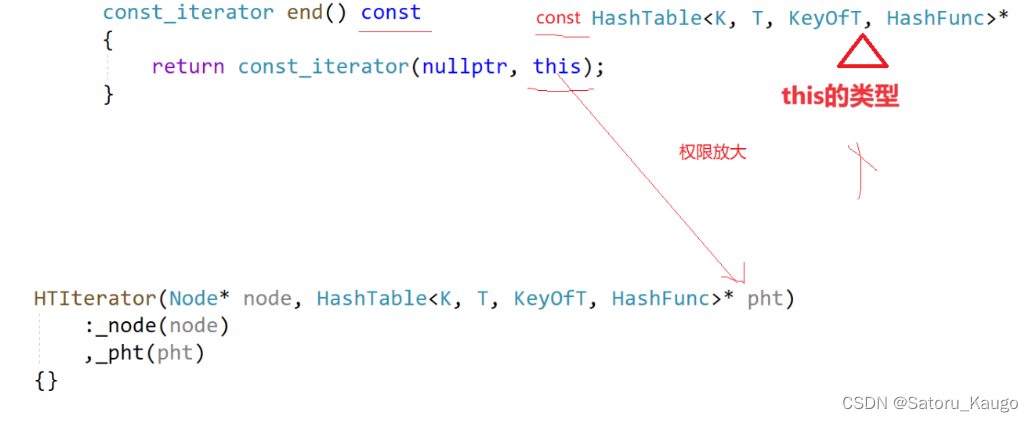
这里如果使用const迭代器会报错,因为发生了权限的放大
修改方法:在参数的位置以及定义的时候给HashTable加上const
这样当我们传const类型的时候发生权限的平移,传普通类型的时候发生权限缩小
const HashTable<K, T, KeyOfT, HashFunc>* _pht;
Node* _node;
HTIterator(Node*node, const HashTable<K, T, KeyOfT, HashFunc>* pht)
:_node(node),
_pht(pht)
{}
2.HashTable与HTIterator的冲突
HashTable中用到了HTIterator,因为要创建出迭代器,而我们HTIterator内部使用到了HashTable中的私有。这就造成了先有鸡还是先有蛋的问题。
解决方法:
在HTIterator的类前面进行前置声明。告诉编译器这个HashTable是存在的

在HashTable中声明友元
五、迭代器的构造问题
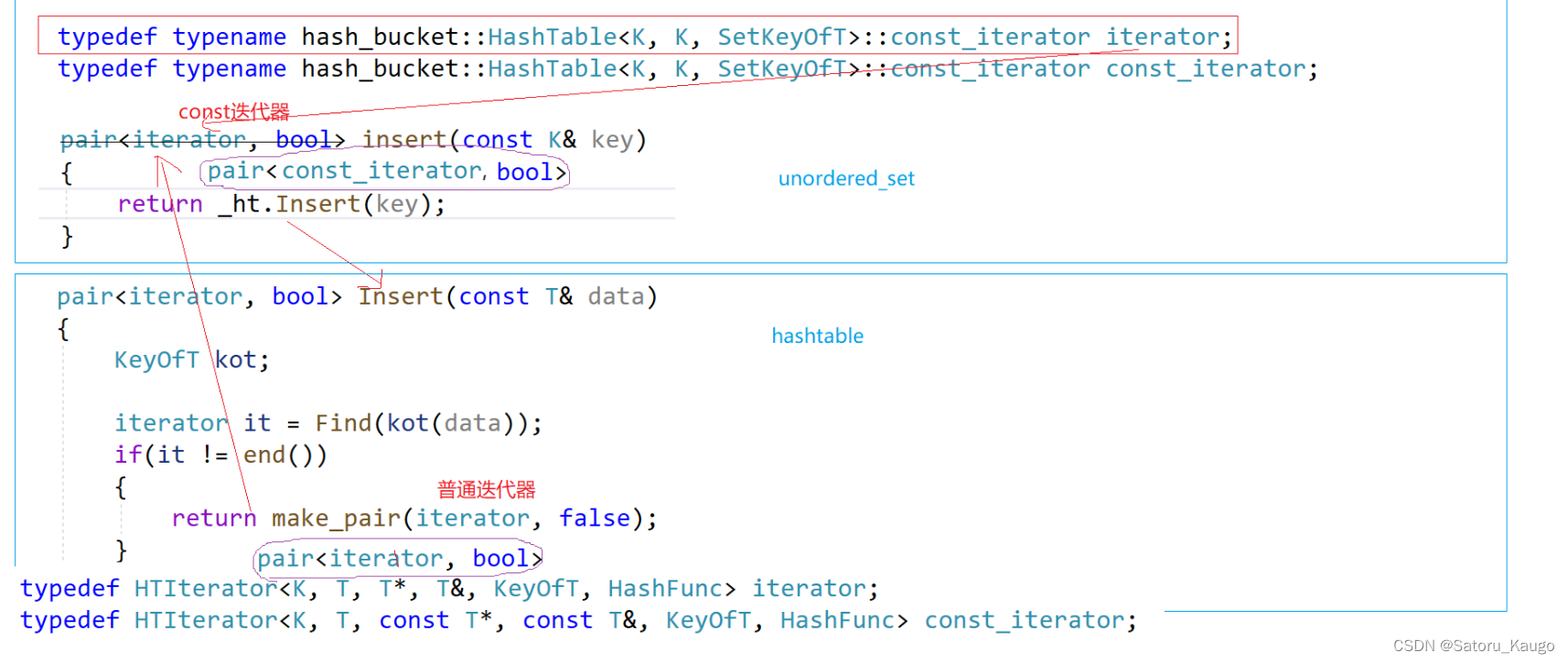
在unordered_set中我们返回的pair里面的iterator是const类型,但我们哈希桶里面写的Insert中的pair返回的是普通迭代器,因为类模板实例化不同的模板参数就是不同的类型,所以这里const_iterator与iterator我们可以看成是两个不相同的类型,如果我们直接传哈希桶里面的Insert返回值会发生报错,因为类型不匹配。
这个时候我们需要一个函数来将iterator类型转变为const_iterator类型,我们可以从迭代器的拷贝构造下手。
typedef HTIterator< K, T, Ptr, Ref, KeyOfT, HashFunc> Self;
typedef HTIterator< K, T, T*, T&, KeyOfT, HashFunc> Iterator;
typedef HashNode<T> Node;
const HashTable<K, T, KeyOfT, HashFunc>* _pht;
Node* _node;
HTIterator(const Iterator& it)
:_node(it._node)
, _pht(it._pht)
{}
如果调用这个函数的是普通迭代器iterator,这里就是纯拷贝构造
如果调用这个函数的是const_iterator,那么这个函数就是构造,我们可以传入普通迭代器iterator来构造出const_iterator
六、完整代码
1.hash_bucket.h
#pragma once
#include<vector>
#include<string>
namespace hash_bucket {
template<class T>
struct HashNode {//结点的定义
T _data;
HashNode<T>* _next;
HashNode(const T& data)
:_data(data),
_next(nullptr)
{}
};
template<class K>
struct DefaultHashFunc {//哈希函数进行下标的求取
size_t operator()(const K& key) {
return (size_t)key;
}
};
template<>//模板特例化
struct DefaultHashFunc<string> {//对字符串特殊处理
size_t operator()(const string& str) {
size_t hashi = 0;
for (auto e : str) {
hashi *= 131;
hashi += e;
}
return hashi;
}
};
template<class K, class T, class KeyOfT, class HashFunc >
class HashTable;
//前置声明
template<class K, class T, class Ptr, class Ref, class KeyOfT, class HashFunc = DefaultHashFunc<K>>
struct HTIterator {
typedef HTIterator< K, T, Ptr, Ref, KeyOfT, HashFunc> Self;
typedef HTIterator< K, T, T*, T&, KeyOfT, HashFunc> Iterator;
typedef HashNode<T> Node;
const HashTable<K, T, KeyOfT, HashFunc>* _pht;
//引入哈希桶,因为我们进行++操作的时候需要哈希桶数组来确定位置
//这里哈希桶要为const类型
Node* _node;
HTIterator(Node* node, const HashTable<K, T, KeyOfT, HashFunc>* pht)
:_node(node),
_pht(pht)
{}
HTIterator(const Iterator& it)
:_node(it._node)
, _pht(it._pht)
{}
Self& operator++() {
if (_node->_next) {
//当前链表后面还有
_node = _node->_next;
}
else {
//当前链表以及走完
KeyOfT kot;
HashFunc hf;
size_t hashi = hf(kot(_node->_data)) % _pht->_table.size();
//kot先取出_node->_data中的K值然后hf算出哈希下标
++hashi;
//从下一个位置开始
while (hashi < _pht->_table.size()) {
if (_pht->_table[hashi]) {
//找不为空的位置
_node = _pht->_table[hashi];
return*this;
}
else {
hashi++;
}
}
_node = nullptr;
}
return *this;
}
Ref operator*() {
return _node->_data;
}
Ptr operator->() {
return &_node->_data;
}
bool operator!=(const Self& s)
{
return _node != s._node;
}
bool operator==(Self& s) {
return _node == s._node;
}
};
template<class K,class T,class KeyOfT,class HashFunc=DefaultHashFunc<K>>
//KeyOfT的作用是取出T里面的K值,因为T有可能为pair类型
class HashTable {
typedef HashNode<T> Node;
public:
template<class K, class T, class Ptr, class Ref, class KeyOfT, class HashFunc >
friend struct HTIterator;//友元的引入
typedef HTIterator<K, T, T*, T&, KeyOfT, HashFunc> iterator;
typedef HTIterator<K, T, const T*, const T&, KeyOfT, HashFunc> const_iterator;
iterator begin() {
//找到数组的第一个不为空的位置
for (size_t i = 0; i < _table.size(); i++) {
if (_table[i]) {
return iterator(_table[i], this);
}
}
return iterator(nullptr, this);
}
iterator end() {
return iterator(nullptr, this);
}
const_iterator begin()const {
for (size_t i = 0; i < _table.size(); i++) {
if (_table[i]) {
return const_iterator(_table[i], this);
}
}
return const_iterator(nullptr, this);
}
const_iterator end()const {
return const_iterator(nullptr, this);
}
HashTable(){
//构造函数
_table.resize(10,nullptr);
}
~HashTable() {
//析构函数
for (size_t i = 0; i < _table.size(); i++) {
Node* cur = _table[i];
while (cur) {
Node* first = cur->_next;
delete cur;
cur = first;
}
_table[i] = nullptr;
}
}
iterator Find(const K& key)
{
HashFunc hf;
KeyOfT kot;
size_t hashi = hf(key) % _table.size();
Node* cur = _table[hashi];
while (cur)
{
if (kot(cur->_data) == key)
{
return iterator(cur, this);
}
cur = cur->_next;
}
return end();
}
pair<iterator, bool> Insert(const T& data)
{
KeyOfT kot;
iterator it = Find(kot(data));
if (it != end())
{
return make_pair(it, false);
}
HashFunc hf;
// 负载因子到1就扩容
if (_n == _table.size())
{
//size_t newSize = _table.size() * 2;
size_t newSize = _table.size()*2;
vector<Node*> newTable;
newTable.resize(newSize, nullptr);
// 遍历旧表,顺手牵羊,把节点牵下来挂到新表
for (size_t i = 0; i < _table.size(); i++)
{
Node* cur = _table[i];
while (cur)
{
Node* next = cur->_next;
// 头插到新表
size_t hashi = hf(kot(cur->_data)) % newSize;
cur->_next = newTable[hashi];
newTable[hashi] = cur;
cur = next;
}
_table[i] = nullptr;
}
_table.swap(newTable);
}
size_t hashi = hf(kot(data)) % _table.size();
// 头插
Node* newnode = new Node(data);
newnode->_next = _table[hashi];
_table[hashi] = newnode;
++_n;
return make_pair(iterator(newnode, this), true);
}
bool Erase(const K& key) {
HashFunc hf;
size_t hashi = hf(key) % _table.size();
Node* prev = nullptr;
Node* cur = _table[hashi];
while (cur) {
if (kot(cur->_data) == key) {
if (prev == nullptr) {
_table[hashi] = nullptr;
}
else {
Node* next = cur->_next;
prev->_next = next;
}
delete cur;
return true;
}
prev = cur;
cur = cur->_next;
}
--_n;
return false;
}
private:
vector<Node*> _table;//定义指针数组
size_t _n;
};
}
2.unordered_set.h
#pragma once
#include"hash_bucket.h"
namespace bit {
template<class K>
class unordered_set {
struct SetKeyOfT {
const K& operator()(const K& key) {
return key;
}
};
public:
typedef typename hash_bucket::HashTable<K, K, SetKeyOfT>::const_iterator iterator;
//重点
typedef typename hash_bucket::HashTable<K, K, SetKeyOfT>::const_iterator const_iterator;
iterator begin()const {
return _ht.begin();
}
iterator end()const {
return _ht.end();
}
pair<iterator,bool>insert(const K& key) {
pair< hash_bucket::HashTable<K, K, SetKeyOfT>::iterator,bool>ret= _ht.Insert(key);
//先拿到为普通迭代器的iterator
return pair<iterator, bool>(ret.first, ret.second);
//用普通迭代器构造const迭代器
}
private:
hash_bucket::HashTable<K, K, SetKeyOfT> _ht;
};
}
3.unordered_map.h
#pragma once
#include"hash_bucket.h"
namespace bit {
template<class K,class V>
class unordered_map {
struct MapKeyOfT {
const K& operator()(pair<K,V>kv) {
return kv.first;
}
};
public:
typedef typename hash_bucket::HashTable<K, pair<const K, V>, MapKeyOfT>::iterator iterator;
typedef typename hash_bucket::HashTable<K, pair<const K, V>, MapKeyOfT>::const_iterator const_iterator;
pair<iterator, bool> insert(const pair<K, V>& kv)
{
return _ht.Insert(kv);
}
iterator begin() {
return _ht.begin();
}
iterator end() {
return _ht.end();
}
const_iterator begin()const {
return _ht. begin();
}
const_iterator end()const {
return _ht.end();
}
V& operator[](const K& key) {
pair<iterator, bool> ret = _ht.Insert(make_pair(key, V()));
return ret.first->second;
}
private:
hash_bucket::HashTable<K, pair<const K, V>, MapKeyOfT> _ht;
};
}
